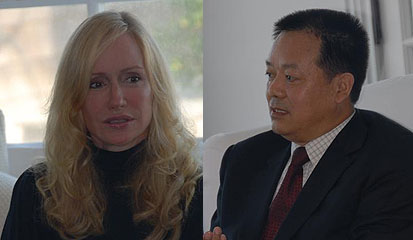|

FACE TO FACE: Senior Chinese Tibetologist Tondrub Wangbum (right) discusses Tibet issues with Louise Blouin MacBain, founder of LTB Foundation during his visit to the United States (Chen Wen)
Slavery, a bitter period in American history, ended more than a century ago in the United States, while for many Americans, its legacy is still felt today like a wound that never heals. But few of them are aware of what the life of Tibetan people was like some 50 years ago, said Tondrub Wangbum, a senior Chinese Tibetologist, during his U.S. visit on July 21.
Tondrub Wangbum, himself an ethnic Tibetan, said that while Abraham Lincoln, the 16th U.S. President, wrote an important chapter in American history by ending slavery, the fact that serfs were liberated in Tibet is little known. "Actually there is no difference between the two events," he said.
Although an increasing number of Americans, both politicians and the general public, are becoming more interested in Tibet and the Tibet issue, the lack of communication and balanced information has led to their limited knowledge of both the history and today's reality of Tibet, said Tondrub Wangbum. He now serves as vice minister of the State Commission for Ethnic Affairs.
Tondrub Wangbum led a four-member delegation of Chinese Tibetologists to visit the United States to exchange ideas on Tibet-related issues. During their one-week stay, the delegation had extensive dialogue with local people, including government officials, legislators, media professionals and think tank members.
See for yourself
Tondrub Wangbum hoped that more people would go to China and see Tibet with their own eyes. His ideas were echoed by Louise Blouin MacBain, Founder and Chairwoman of the Louise T Blouin Foundation, a non-profit organization for promoting culture and creativity in resolving global issues.
"It is difficult to appreciate present-day Tibet Autonomous Region without physically traveling to Lhasa in order to see both the ancient and sacred sites situated on the high-plateau, but also to witness the amount of development that has occurred since 1950," wrote MacBain, who was the first foreigner to visit Lhasa in late May, after the the March 14 riots there.
Since the Dalai Lama had voiced much criticism about "cultural genocide" in Lhasa, MacBain told Tondrub Wangbum's group on July 19, in Long Island, New York City, that it was important for her to see with her own eyes the truth and the reality of the situation.
"I didn't see any cultural genocide there," said MacBain. She spoke favorably of the Chinese Government's persistent policy in preserving the Tibetan culture over the past years and its new commitment of investing another $70 million in the next five years for this purpose.
MacBain offered her foundation's help, saying that the Louise T Blouin Foundation in the coming months will launch an international fund with the goal of promoting Tibetan culture internationally. This fund will act as a complement to the $70 million that the Chinese Government has already allocated for cultural preservation efforts inside Tibet. "It is my belief that through dialogue, empathy and greater cultural understanding we can bring into harmony China and the international heads of state that care about Tibet," she said.
| 